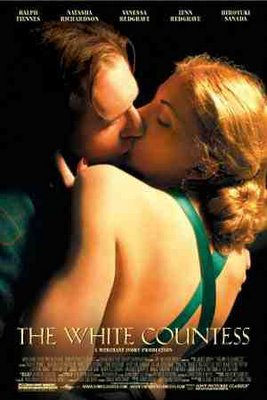
I read a comment on another blog a few days ago which disparaged The English Patient, a film that happens to be one of my favorites. I certainly don't set myself up as an arbiter of good taste, and it's worthwhile revisiting the adage that one person's treasure is another's tripe. But there are a lot of ways to be right, a lot of ways for a thing to be beautiful or valid or pertinent, especially with art--particularly with art; and this movie's portrayal of a momentous personal event--a tempestuous, adulterous affair--set against the backdrop of sweeping global events--the Second World War in North Africa--made an effective and enthralling story to me. At the time the movie came out I was living with the losses and re-awakenings following a divorce, and with some personal relationship things that, in retrospect, may have resonated with this movie such as to blow its charms out of proportion to its actual merits. But I'm not convinced of that: I loved it at the time and I still do. (I can't help also noting Anthony Minghella's skill in turning that book into a reasonably coherent movie. Its film potential is certainly not what came to my mind as I read it!)
Tonight's movie offering, Merchant-Ivory's The White Countess, struck me in a similar, tho less forceful, way. (I was going to say "English Patient Lite," except that Lite is just not an applicable word in this dreary, threadbare world.) Again we find a relatively small-scale personal story told amid roiling world affairs, but neither the personal story nor the world affairs are as well-defined or as engaging. I think it also doesn't help that this just isn't the most attractive cast of characters. Everyone is a wee bit drawn and tired, sickly, downtrodden. Set in Shanghai in the late '30s-early '40s, the film is visually evocative, and the camera lingers enough for us to get a sense of the surroundings, the crowded sidewalks and markets and tenements, the street smells, the chaos of a densely-populated, poor city.
Ralph Fiennes plays a blind American former diplomat who dreams of setting up a bar in Shanghai, a dream I found it hard to get on board with. After setting the stage somewhat, his story is connected to that of Natasha Richardson, who plays a deposed Russian Countess living in a crowded flat with her vile and haggard deposed royal--and now very poor--family. Richardson, for reasons never adequately explained, is selected as the sole breadwinner for the family, a role for which she is held in contempt by her non-working relatives who, apparently, are unhappy with the manner in which they are being sustained. One comes to hope Dick Cheney will show up and exercise his newfound skill of firing indiscriminately into the crowd.
Things just don't quite play out the way I, at least, expected, and yet I fail to find the variation meaningful, or the low-grade suspense rewarded with anything very salient or revelatory.
After praising the quiet and nuance of Woody Allen's Match Point, I must admit that film seems like Die Hard With a Vengeance next to The White Countess. The screenplay comes from the pen of novelist Kazuo Ishiguro. (I don't remember if I actually made it through Ishiguro's "The Remains of The Day"--the book; I did see the movie, both years ago--but I do remember it as being similarly slow-moving.) The White Countess is a movie that takes a very long time to cover fairly modest territory, and each step is given ample space to breathe. There's a lot of silence in the movie, and two and a half hours is given over to telling a central tale to which Hollywood might give an hour. And that part's OK. There's a sense of settling into one's chair and observing each little scenario as though one were present in person. I love the idea of room to contemplate. But at times even I thought things could move along a bit.
Traditionally, I have to sleep on a movie to see what I really thought of it. Think of it as the ultimate inability to think on my feet. But this one begs for that treatment from me. We'll see how it looks in the morning light. For now (to quote Pulp Fiction) "I ain't fer sure yet."
1 comment:
I really disliked The English Patient. I couldn't sympathize with any of the characters. Why would I care if he died or not? Where did her love come from?
Can't say anything about The White Countess.
Pulp Fiction - awesome movie!
Post a Comment